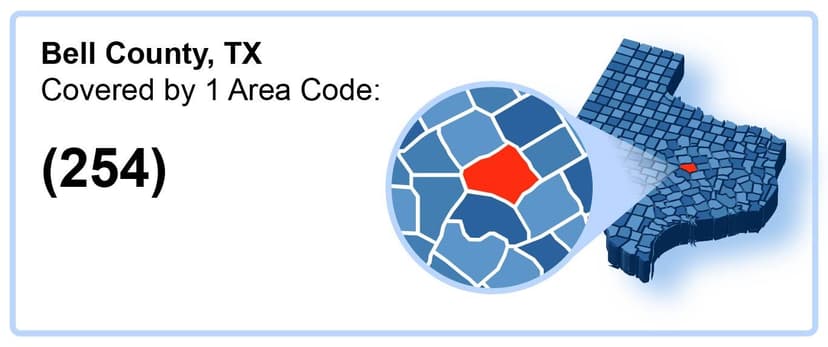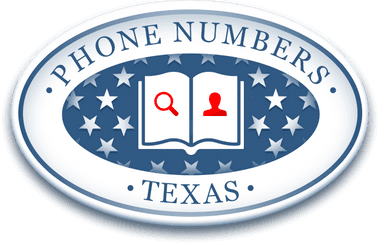What are Bell County Area Codes?

The area code system is a part of the North American Numbering Plan (NANP). Area codes are the three-digit numeric prefixes at the start of all North American phone numbers. An area code identifies a geographical location as a Numbering Plan Area (NPA). The Public Utility Commission of Texas is vested with the authority to implement and maintain area codes in Texas, including Bell County. Residents can find the area code that serves Bell County by using any of the area code lookup services available online.
Currently, only one area code serves Bell County.
Area code 254
Area code 254 is the NANP area code that covers all of Bell County. It was created as a split from the 817 NPA in 1997. Area code 254 covers several cities and communities in Bell County, including Belton, Copperas Cove, Harker Heights, Killeen, and Nolanville. Others are Fort Hood, Holland, Little River-Academy, Salado, and Temple, Troy
What are The Best Cell Phone Plans In Bell County?
A 2018 National Center for Health Statistics survey on household wireless telephone substitution in Texas revealed a marked shift from traditional landlines to wireless telephony by Texans. Results showed that 67.9% of adults and 76.6% of children had adopted wireless-only telephones. In contrast, only 2.5% of adults and 1.4% of children still use landline phones exclusively, indicating their preference for wireless telephony over the traditional landlines. Wireless telephony has the advantage of mobility, flexible subscription options, and more functionalities such as texting, video calls, and more.
The four major national carriers operate in Bell County. T-Mobile and AT&T are the top two service providers in the state. T-Mobile has 96% coverage, followed by AT&T that covers 90% of the county. Verizon has 78% coverage, while Sprint has a 64% spread. Mobile Virtual Network Operators (MVNOs) also offer network services in the county. They provide residents with more subscription options, and mostly at cheaper rates. This is because they leverage existing infrastructures of national carriers and have little or no maintenance costs.
Bell County residents and businesses alike also use the Voice over Internet Protocol (VoIP) telephony service. VoIP technology uses the internet to transmit voice calls between users and is compatible with smartphones, tablets, landlines (with a VoIP adapter), and computer systems. VoIP offers Bell County residents unlimited local calls, a flat rate for long-distance calls, and more flexibility, among other affordable telephone services.
What are Bell County Phone Scams?
These are scams perpetrated by fraudsters via live phone calls, text messages, and robocalls to defraud Bell County residents. Phone scammers trick their targets into divulging confidential information such as their Social Security Numbers, personal identification numbers, credit card details, and checking account numbers. Residents can use reverse phone number lookup services to identify who called them with suspicious phone numbers.
Some phone scams are common in Bell County. These include:
What are Emergency Scams?
Emergency scams are also known as grandparent scams and are common in Bell County. Here, senior residents receive phone calls from scammers who claim to be their grandchildren or wards. In a typical emergency scam script, the impersonator claims to have been arrested in a foreign country or involved in another emergency that requires an urgent financial fix. The caller then pleads with their target to wire money to them urgently.
Senior residents are advised not to send money to anyone hastily. Instead, they should hang up and call a close relative or friend to confirm the caller’s claim. A free reverse phone look up can be performed to verify the identity of such a caller.
What are Law Enforcement Scams
Scammers defraud Bell County residents by impersonating officers from the County Sheriff's Department. In a version of this scam, the caller claims their target has an active warrant that requires their DNA to be taken. However, due to the COVID-19 pandemic, all transactions must be conducted over the phone. The target is then asked to visit a local grocery store to purchase prepaid cards for various amounts of money to make immediate payment for the warrant to be cleared. Throughout the transaction, the caller stays on the phone with the target. During the call, there will be sounds of police scanners in the background, and the caller quotes the Sheriff's Department Public Service Office number, (254) 933-5412, as a reference. Performing a reverse phone lookup may help the recipient to answer the question, "who is this number registered to?"
The Bell County Sheriff reiterates that the Department does not request gift cards to satisfy arrest warrants under any situation. They will never call anyone concerning an arrest warrant or ask for arraignment to be made over the phone. Residents who receive such calls are advised to end the call and report the incident to the Sheriff immediately.
What are IRS Scams?
In these scams, the caller pretends to be a representative of the Internal Revenue Service (IRS) to perpetrate tax identity theft on unsuspecting residents. Although IRS scams occur all-year-round, they are more prevalent during tax-filing seasons. IRS scammers trick county residents into making payments or providing their financial information by insisting they owe the government back taxes. The fraudster then promises to delete the target's debt record if they pay a certain amount of money immediately. The scammer may resort to the use of threats of arrest, deportation, suspension of driver's license, or social security numbers to get their mark to pay. Their common targets are immigrants and elderly residents. IRS scammers’ preferred payment methods are prepaid debit cards, gift cards, or wire transfers. Phone number search services will help residents ascertain whether such calls are actually from the IRS.
What are Charity Scams?
Here, scammers take advantage of the COVID-19 pandemic to extort money or gifts from residents by impersonating charity organizations. Scammers call to request funds or gift cards to assist families, small-scale businesses, and patients who are casualties of coronavirus. County residents are advised to investigate charities and verify their legitimacy before making donations.
Giveaway signs of fraudulent charitable organizations include:
- High-pressure solicitations.
- Charities that look or sound like well-known organizations
- New organizations formed in the wake of a natural disaster or tragedy
- Requests for personal information
- Avoidance of the U.S. mail
A reverse phone search can help verify if the caller is actually from a charitable organization.
What are Robocalls and Spam Calls?
Robocalls are automated calls made through autodialers to deliver pre-recorded messages. Robocalls were originally used by political organizations, businesses, and telemarketing companies to disseminate information to a large number of people regularly and at very minimal costs. However, due to its proliferation, the government is forced to place restrictions on its use. Because of this, only robocalls made from legitimate charity organizations to solicit funds, political campaign calls, and calls endorsed by recipients are considered legal. Telemarketers must get the consent of recipients before calling them. Unwanted and unsolicited telemarketing calls made to Bell County residents are therefore illegal and regarded as spam calls.
Unfortunately, robocalls have been hijacked by scammers to execute their nefarious acts. Besides using VoIP technology to hide caller identification numbers and locations of robocalls, scammers find them a cheaper and more effective method of reaching mass targets. Using a phone lookup service may help to determine if an incoming call is a robocall. In addition, county residents are advised to enlist their phone numbers on the National Do Not Call Registry to prevent illegal robocalls and telemarketing calls.
Additional precautions county residents can take to reduce harassment from robocalls include:
- Ending calls from unknown numbers immediately or allowing them to go to voicemail.
- If you answer a call and discover it is a robocall, hang up immediately. Disregard any instruction by a robocall message. Acting on such instructions will lead to more unwanted calls.
- Set your phone to block unsolicited calls by default. All Android and iOS smartphones have inbuilt settings that enable users to block suspicious phone numbers and flag them as spam phone numbers.
- Third-party call-blocking applications such as Truecaller, YouMail, and Nomorobo are available online for free downloads. Install any of them on your phone.
- Enlist your phone number on Texas Do Not Call Lists.
- Report robocalls to the FTC online or call 1 (888) 382-1222.
- File robocall complaints online with the Federal Communications Commission (FCC)
How to Spot and Report Bell County Phone Scams
Scammers constantly innovate new scams to coerce residents into divulging their confidential information. Scare tactics, misinformation, impersonation, and deception are some of the tricks they employ to extort their targets. While reverse phone searches may help reveal the identity of phone scammers, having first-hand knowledge of their tactics is a better alternative for residents to avoid being scammed.
Common signs of Bell County phone scams include:
- The caller spoofs the phone number of the County Sheriff's Department or the local police to coerce you into giving up confidential information or demand payment for various reasons.
- The caller claims to be from the IRS, demands immediate payment for your back taxes, and threatens you if you don’t comply. Common threats employed include arrest, suspension of social security numbers or driver's license, and deportation.
- The caller uses high-pressure sales tactics and limited-time offers and is reluctant to answer questions about the business or the offer.
- The caller requests you to confirm your personal information to get you to divulge credit card details, social security number, date of birth, or bank information that can be used for identity theft.
- The caller requests you to make payment by specific means other than credit cards such as wire transfer, gift card, cash, or private courier. On other occasions, they request your credit card details to pay for shipping and handling fees.
- The call is a prerecorded message.
- The caller claims you have a virus on your computer or requests permission to log in to your computer remotely
- The caller claims to be a friend or relative in need of money for an emergency, but they insist you must not contact other persons as it must remain a secret.
Performing reverse phone number lookups regularly on incoming calls can limit the chances of residents becoming victims of phone scams. However, Bell County scam victims or those who have reasons to believe they are being targeted by scammers are encouraged to file their complaints with the following agencies:
- Bell County Sheriff’s Department: Bell County residents who have been contacted by suspected phone scammers are encouraged to note the suspicious phone numbers and file reports with the County Sheriff immediately. Bell County Sheriff's Department can be reached at (254) 933-5412.
- Bell County District Attorney: The District Attorney is the "chief lawyer for the people" in Bell County. Victims of phone scams may contact the Victim Services Division of the DA's office at (254) 933-5235 or (800) 460-2355 ext. 5235 to file their reports.
- Texas Attorney General's Office: As the chief law enforcement agency in Texas, the Attorney General’s Office protects Texans from scams by accepting complaints, filing civil cases, and educating them on how to avoid scams. Bell County scam victims can file complaints online with the Consumer Protection Unit, or call their Consumer Hotline at 1-800-621-0508.
- Federal Communications Commission: Victims of illegal robocalls can file complaints with the FCC online.Federal Trade Commission: County residents can reduce the barrage of robocalls by registering their phone numbers on the FTC's National Do Not Call Registry. Any unsolicited call received after 31 days of a phone number registration should be reported to the FTC. It is a potential scam call. Residents who are scam victims can also report the incidents online to the FTC
